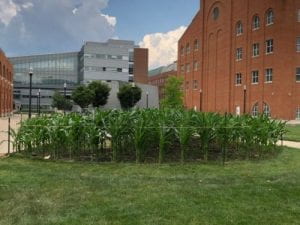
Fighting food waste is yet another front in the CFAES purpose of “We Sustain Life.”
Continue reading A look at ways CFAES is helping fight food waste

Fighting food waste is yet another front in the CFAES purpose of “We Sustain Life.”
Continue reading A look at ways CFAES is helping fight food waste
Reupping this from a year ago …
Pumpkins rotting in landfills produce methane, a climate change-causing greenhouse gas, and an especially scary one at that—it’s 20 times stronger than carbon dioxide.
So, if you don’t send your old pumpkin out in the trash, destined for burial in a landfill, what’s the best thing you can do with it?
We talked to three experts from CFAES for options. Spoiler alert: Sometimes (dun dun dun) they come back.

Come learn from some of the biggest and best—the SMSC Organics Recycling Facility in Minnesota, and Barnes Composting in Huron—on the Composting in Ohio and Beyond tour. It’s set to take place virtually on Aug. 25.
Food waste rotting in landfills emits methane, a greenhouse gas that makes climate change worse.
But an award-winning group of CFAES students is doing its part to fight the problem, starting at home on the Ohio State campus.
Continue reading They’re showing the hows and whys of fighting food waste
Pumpkins rotting in landfills produce methane, a climate change-causing greenhouse gas, and an especially scary one at that—it’s 20 times stronger than carbon dioxide.
So, if you don’t send your old pumpkin out in the trash, destined for burial in a landfill, what’s the best thing you can do with it?
We talked to three experts from CFAES for options. Spoiler alert: Sometimes (dun dun dun) they come back.

Continue reading So you’ve got an old pumpkin to get rid of …
Many of CFAES’ upcoming events have been cancelled or postponed due to the global coronavirus outbreak. Among them are the Sustainable Landscaping Workshop on March 18, the CFAES Sesquicentennial Open House on March 21, the Ohio Compost Operator Education Course on March 25-26, and the Ohio River Valley Woodland and Wildlife Workshop on March 28.

Find further details and updates on our event calendar, and if you’re not sure whether an event is still happening or not, be sure to contact the organizer ahead of time.
As a sustainability intern with Ohio State’s Zero Waste team, CFAES student Melina Mallory, pictured below, spent most of every football game day this season helping divert the tons of waste generated at Ohio Stadium—the beverage cans, nacho trays, and more from 105,000 people—away from landfills and into composting or recycling.

How did she and the team do? Here’s a hint: The football Buckeyes aren’t the only ones ranked No. 1 in the country.
In a recent Ohio State story, Los Angeles native Mallory, an environmental science major specializing in water science in CFAES’ School of Environment and Natural Resources, said, “To be at Ohio State where you have a platform to show people this is what our world has to start doing, and we are doing it, is pretty cool.”
Read the full story. (Photo: Ohio State News.)
 That small corn patch you see in this photo, which is growing—indeed, thriving—in the middle of Ohio State’s Columbus campus, is part of a wider, sustainability-related project meant to show how biosolids—processed human waste from sewage—can be (and historically have been) used to help grow food. Get the full poop in our latest CFAES Story.
That small corn patch you see in this photo, which is growing—indeed, thriving—in the middle of Ohio State’s Columbus campus, is part of a wider, sustainability-related project meant to show how biosolids—processed human waste from sewage—can be (and historically have been) used to help grow food. Get the full poop in our latest CFAES Story.
This year’s Composting in Ohio tour, set for Aug. 22 and co-sponsored by CFAES’ Ohio Composting and Manure Management Program (OCAMM), will feature four unique large-scale composting facilities located in Cleveland and Akron.

Tour-goers, organizers say, will get a close look at the sites’ operations and a chance to learn from experts.
We sent out a press release today that has more details about Manure Science Review, set for Aug. 7 in Strasburg in northeast Ohio. Check it out.